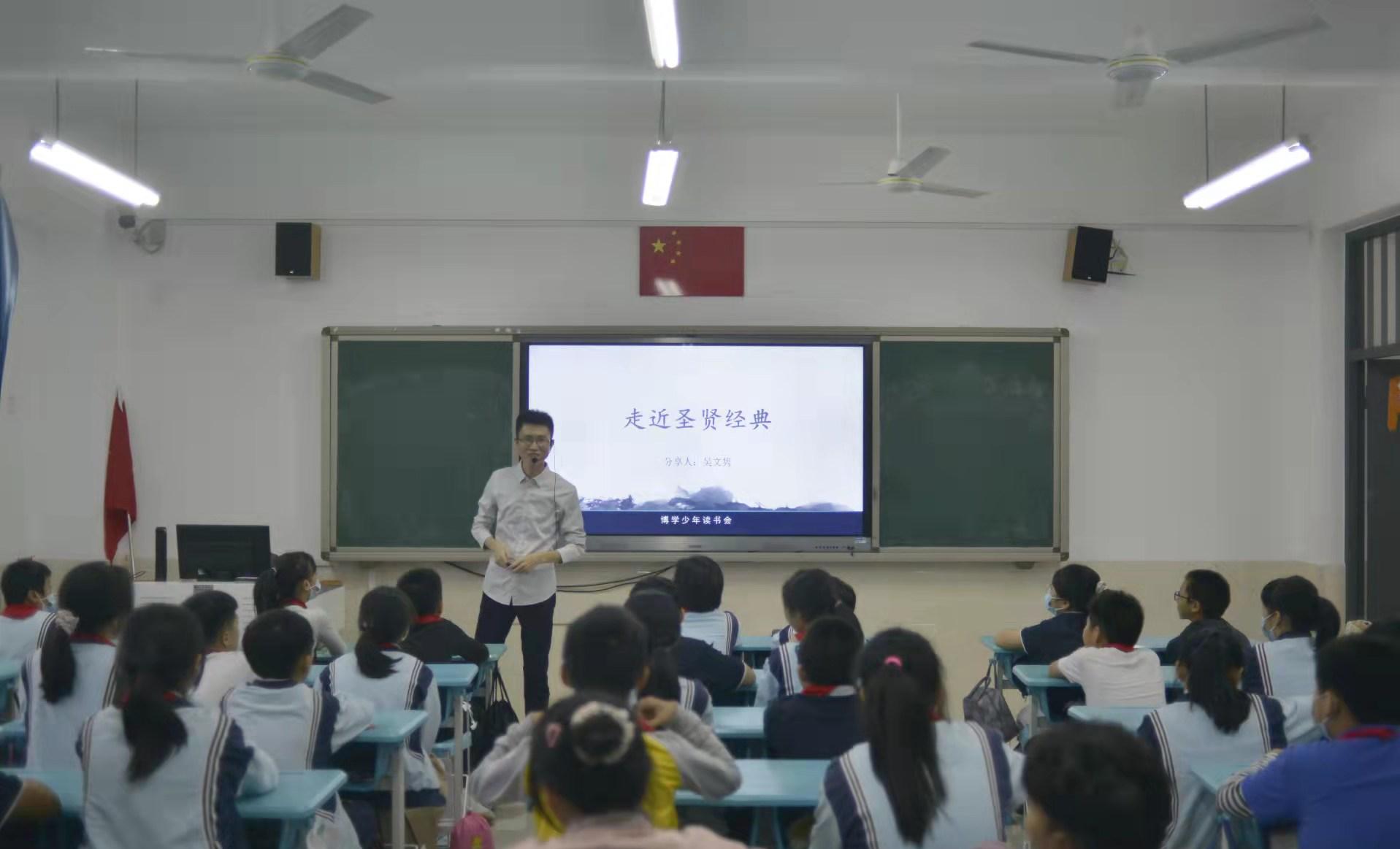Herald News (Fuzhou correspondent Lin Qin/Wen Correspondent Li Wenqi/Photo) In order to let the classics of traditional Chinese studies enter the campus, let students walk with the sages, and deepen their understanding of Confucius in the midst of hearing and seeing, on the 3rd, Wu Wenjun, a teacher of the Erudite Junior Reading Club, brought a vivid and funny "Approaching the Sage Classics" community class to the students of the sixth (1st) class of Wenquan Primary School.

"Students, do you know what this place is?" At the beginning of the class, Teacher Wu Wenjun first sold a "Guanzi" to let the students guess the puzzle. This trick is indeed "eye-catching", "three squares and seven alleys, the Forbidden City, the Confucius Temple..." The students speculated one after another, and the atmosphere in the classroom was instantly active.
Originally, this magnificent building was the Confucius Temple, which was rebuilt the second year after Confucius's death (478 BC) on the basis of the former residence of Confucius during his lifetime. After the successive dynasties continued to expand and renovate, the scale became larger and larger, especially in the Ming and Qing dynasties, imitating the style expansion of the Forbidden City in Beijing, covering an area of more than 600 acres. "What do you pronounce these two words?" Seeing the traditional character "Lubi", the first reaction of many students was "Sprite", and the whole class burst into laughter. What was the situation that there were Sprite advertisements in that era? In the laughter, the students easily and happily remembered what "Lubi" was: when Qin Shi Huang burned the book, Confucius IX's grandson Kong Kui hid the classics such as "Analects", "Shang Shu", "Li Ji", "Spring and Autumn", and "Filial Piety" in the walls of Confucius's former residence.
In just two lessons, Mr. Wu Wenjun introduced the Analects and its books, how the ancients read the Analects, and extended reading to deepen their understanding of the Analects with vivid and humorous explanations. Following his explanation, the students seemed to go back to the Spring and Autumn Period when the mission and pursuit of life were born of gentlemen.
The Analects, compiled by Confucius's disciples and his disciples, is one of the classic works of the Confucian school, which embodies Confucius's political ideas, ethical thoughts, moral concepts, and educational principles. It is called "Four Books" together with "University", "Zhongyong", and "Mencius"; and "Poetry", "Book", "Li", "Yi", "Spring and Autumn", and "Four Books and Five Classics". "Zi Yue: Learn and learn from time to time, don't you also say? Have friends from afar, are you happy? People don't know and don't care, aren't they gentlemen? I asked a child to translate the meaning of this sentence." Teacher Wu Wenjun asked a question. Huang Weijia replied: "Confucius said: Isn't it also very happy to review and practice what you have learned on time?" Isn't it also very happy to have friends from far away? Others don't understand themselves, but they are not angry, is not he also a cultivated gentleman? "This is a common translation, but students, do you find that there seems to be no connection between the three sentences in this translation?" Is there a problem with Confucius's words, or is there a problem with the translation? Teacher Wu Wenjun went from shallow to deep, and from this question, he introduced how the ancients read the Analects, which stimulated the students' interest in understanding the Analects.
This chapter of the book is the meaning of Confucius teaching people to study diligently. The first "learning" refers to learning. So, what is the content of the study? Zhu Xi explained the word "learning" of "learning and learning": "Scholar, Jueye. That is to say, to realize the natural truth of heaven and earth and to enhance their own realm of life. Many people think that learning a lot of skills and remembering a lot of knowledge is learning. But in Confucius's view, "How many gentlemen are there?" Not much"--The real learning is "consistent", the process of continuous effort in order to achieve one's own and even more people's lives. It does not require everyone to have profound knowledge, nor does it require a show off of skills, but it can guide us to act with integrity and the right way. Zhu Xi, a master of science in the Southern Song Dynasty, pointed out that what this verse describes is the "door to enter the Tao, the foundation of accumulated virtue" of man. Confucius believed that "it is a joy to learn the laws of nature in heaven and earth, and to learn them often in the practice of life." Having like-minded friends and learning together from afar is even more gratifying. Even if others don't know themselves, they can enjoy themselves, and such a person can be regarded as a gentleman. ”
After the class, the students were still unsatisfied, and they discussed Confucius around Teacher Wu Wenjun. "Before, I didn't like to read Confucius because it was so boring. Through today's community class, we approached the sages, deepened our understanding of Confucius, and further stimulated my interest in traditional culture! This weekend, I will definitely find a copy of "The Story of Confucius" to read in detail. Zhong Youchang said.
It is reported that the purpose of the Erudite Youth Reading Club is to lead the children to carry out solid and systematic general education in the fine reading of famous works by professional teachers, and to cultivate young people in the new era who are knowledgeable about the past and the present, and who have both ability and political integrity. For primary and secondary school students, Mr. Wen Jun has guided the classics of traditional Chinese studies such as "Analects" and "History", as well as Eastern and Western myths and masterpieces.